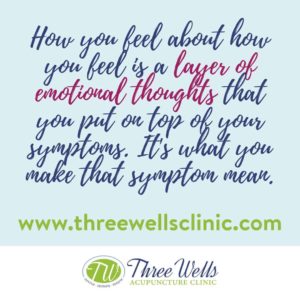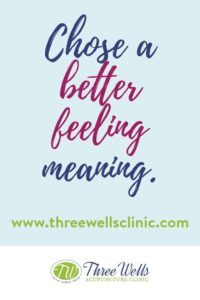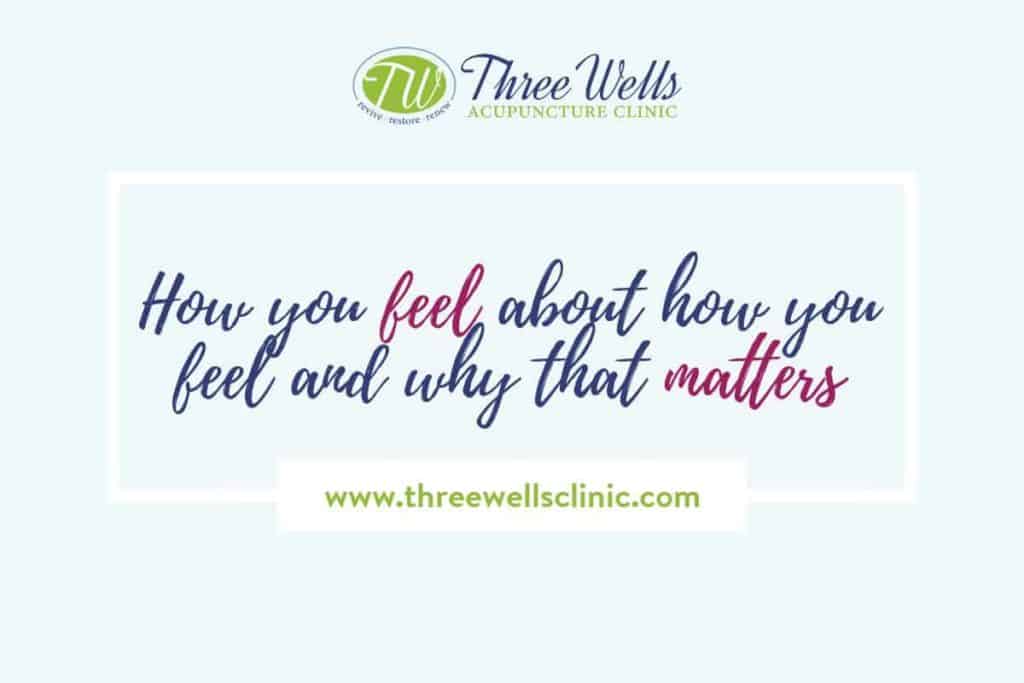Let’s talk about the difference between how you feel – and how you feel about how you feel.
Huh? Confusing statement, right? I promise you’ll see what I mean shortly.
“How you feel” is your initial physical or emotional symptom(s).
- I feel tired.
- I have a blister on my foot.
- My knee throbs.
- I feel sad.
- My heart is racing.
- My blood pressure is elevated.
How you feel about how you feel is a layer of emotional thoughts that you put on top of your symptoms. It’s what you make that symptom mean.
This is just as important to change as the symptom itself. Here are some examples:
- I feel tired – OMG what is happening to me?!?
- I have a blister on my foot – See? I’m totally incapable, I’ll never be able to work out!
- My knee throbs – I’m falling apart!! I’m getting so old!!
- I feel sad – Why?! I shouldn’t be feeling this way! What is wrong with me?!?
- My heart is racing – oh no am I going to die?!?
- My blood pressure is elevated – Yikes. I’m getting old. Everyone in my family has high blood pressure too. I just knew this would happen!
Do you hear the stress when you read these examples?
So why does it matter to differentiate the two?
This is super important: Stress and symptoms can circle around in an ever-increasing cycle. More stress worsens the symptom, a worse symptom increases the stress, which then creates another symptom, which then….. (you get the picture)
Stress will feed the symptoms and cause new ones, all the while complicating the treatment plan.
This happens most often with:
- new symptoms that are unfamiliar
- symptoms that we associate with scary diagnosis words
- chronic symptoms that go away for awhile and then come back.
However if your thoughts are on autopilot, you might do this with every symptom that comes up.
What to do about it?
 First, notice. Being aware of when you’re doing it will make a big difference.
First, notice. Being aware of when you’re doing it will make a big difference.
Identify which is the actual symptom and which is your emotional explanation. This can easily dissipate 50% of the emotional charge of that thought.
Once you realize what you are making the symptom mean, you can then find a relief thought that feels a little better.
Let’s take the knee pain example.
“My knee hurts. I’m just falling apart and it’s only going to get worse.”
becomes…
“My knee hurts. Oh, that makes sense, I stood on concrete for six hours yesterday. I bet it’ll feel better if I rest it today.”
Can you see the despair and hopelessness in the first example versus the understanding and actionable idea in the second statement?
Just that little difference takes a whole load of stress off.
Let’s do another…
“I feel so sad. What is wrong with me? I’m always crying, what if it never stops?! They’re going to put me on medication, I just know it!”
becomes…
“I feel so sad. Grandma’s funeral is still fresh and so much is changing at work. It’s totally natural to feel sad and cry. Maybe I can take it easy this week and go to bed a little earlier.”
And one more example:
“My blood pressure is elevated – Yikes. I’m getting old. Everyone in my family has high blood pressure too. I just knew this would happen!”
becomes…
“My blood pressure is elevated. Well, I do have three cups of coffee and two cans of pop a day and my doctor said that caffeine affects blood pressure. I wonder what will improve if I cut back by half. I can try that.”
Which feels better? Neither one changes the fact that you feel the symptom, and both are believable thoughts. But one clearly feels worse and one feels better.
The better feeling one will cause you much less stress.
Let me be clear. You’re not trying to be Pollyanna about this, putting on a fake cheerful smile or pretending that the symptom doesn’t exist. You are simply choosing a better feeling meaning to why this symptom is happening while you are trying to take care of it.
Try this out. Think about a current symptom you have and write down what you are making that symptom mean. Can you change the meaning to something that feels better?
Then, if you need help with your symptoms, click here to book an appointment with me.
This post may contain affiliate links, meaning I may receive a commission (at no extra cost to you) if you use that link to make a purchase. See my disclaimer.
Is Three Wells right for you?
Get a free 15 minute Q&A consultation to find out!
